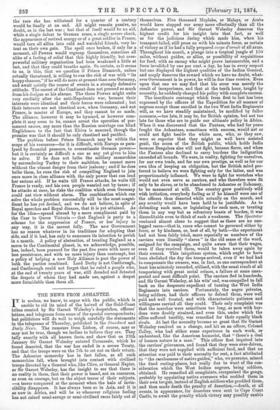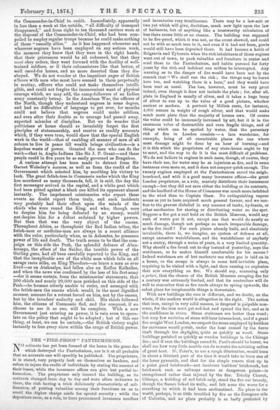THE NEWS FROM ASHANTEE.
IT is useless, we know, to argue with the public, which is unable to rid its mind of the hatred of the Gold-Coast tribes created by Sir Garnet Wolseley's despatches, officers' letters, and telegrams from some of the special correspondents; but politicians will do well to weigh carefully the statements in the telegrams of Thursday, published in the Standard and Daily Nuts. The rumours from Lisbon, of course, may or may not be true, though we incline to believe they are. They tally exactly with all known facts, and show that on 29th January Sir Garnet Wolseley entered Coomassie, which he found deserted, that the war has ended in a severe Treaty, and that the troops were on the 7th to set out on their return. The Ashantee monarchy has in fact fallen, as all such monarchies fall, when brought into contact with civilised troops directed by a General who, like Clive, or General Napier, or Sir Garnet Wolseley, has the insight to see that there is no reality in them, that their power is based, not on resources, or even on courage, but on the abject terror of their subjects, —a terror conquered at the moment when the halo of invin- cibility disappears. It has always been so in Asia, and it is so now in Africa, and will be so whenever religious feeling has not raised semi-savage or semi-civilised races fairly out of the race she has withstood for a quarter of a century themselves. Five thousand Moplahs, or Malays, or Arabs would be finally at an end. All might remain passive, no would have stopped our army more effectually than all the doubt, as in the last war ; but that of itself would be no aid, Ashantee power, and Sir Garnet Wolaeley deserves the while a single defeat to German arms, a single severe check, highest credit for his insight into that fact, as well the appearance of revived energy or of a great soldier in France, as for the judicious daring which made him, when his would turn all allies into cold and watchful friends, very in- transport failed, still press on with his minute force, as certain tent on their own gain. The spell once broken, if only for a of victory as if he had a fully prepared corps d'artne's of all arms. moment, all Powers would regroup themselves, conscious all Throughout his march, a plunge into a tropical jungle of 150 alike of a feeling of relief that this highly friendly, but over- miles, without guides, or allies, or possibility of requisitions powerful military organisation had been weakened a little at for food, with an enemy who might prove innumerable, and a last, and that they could breathe again. So certain, as it seems force invalided by one per cent. a day, he has in every respect to us, is this, that we question if Prince Bismarck, unless but one displayed the highest qualities of the Indian General, actually threatened, is willing to run the risk of war with " its and amply deserves the reward which we have no doubt, what- happychances," if he will do more at present than arm Germany, ever Government is in power, he will in due time receive. Even and await quietly the course of events in a strongly defensive upon that one we may find that his error was merely the attitude. The unrest of the Contiuent does not proceed so much result of inexperience, and that at the tenth hour, taught by from his designs as his alarms. The three Powers might unite necessity, he suddenly changed his policy with complete success.
very cordially after the anti-Napoleonic war, because their The inordinate contempt which from first to last has been interests were identical and their forces were exhausted ; but expressed by the officers of the Expedition for all manner of their interests are not identical now, when Germany, and not negroes except those enrolled in the two West India Regiments France, is master of Europe, and they cannot be so made. will, as we have steadily maintained, be modified by fuller The alliance, however it may be hymned, or however corn- accounts,—too late, it may be, for British opinion, but not too plete it may seem to be, cannot arrest the operation of per- late for those who are to guide our ultimate policy in Africa. manent causes, any more than the Russian marriage can blind When it was discovered that the Fantees, who had for years Englishmen to the fact that Khiva is annexed, though the fought the Ashantees, sometimes with success, would not or promise was that it should be only chastised and pacified. could not fight beside the white men, who, as they saw, The problem before Prince Bismarck may be within the were so superior that they might as well have assisted scope of his resources—for it is difficult, with Europe so para- genii, the acorn of the British public, which holds India lysed by financial pressure, to overestimate German power— because Bengalees also will not fight, became fierce, and when but it is certainly as difficult a one as any yet given to him the Fantees also declined to carry burdens the indignation to solve. If he does not bribe the military monarchies exceeded all bounds. We were, in reality, fighting for ourselves, by surrendering Turkey to their ambition, he cannot move for our own trade, and for our own prestige, as well as for our without the utmost danger from their jealousy ; and if he does own idea of keeping an obligation, but the British mind pre- the Commander-in-Chief to remit. Immediately, apparently in less than a week at the outside, " all difficulty of transport disappeared," and from eight to ten thousand carriers were at the disposal of the Commander-in-Chief, who had been com- pelled to employ regular troops because he could make nothing of those "rascally allies." As it has happened whenever and wherever negroes have been employed on any serious work, the moment they knew that they were in the right hands, that their grievances would be all redressed, but that they must obey orders, they went forward with the docility of well- trained soldiers, or if their calumniators like that better, of well cared-for horses, and no more deserted than they dis- obeyed. We do not wonder at the impatient anger of British officers with men who must have seemed to them perpetually in mutiny, officers who could not make themselves intelli- gible, and could not forgive the inconvenient want of physical courage which, we may add, the camp-followers of an Indian army constantly betray. In the American War, the officers of the North, though they understood negroes in some degree, and had no difficulties of language to get over, for months could not believe that negroes could make soldiers, and even after their doubts as to courage had passed away, expected miracles of discipline. But we do wonder that politicians at home should so invariably forget the first pinciples of statesmanship, and receive so readily accounts which, if they were true, would show that the special English work in the world—that of enabling all manner of men of all colours to live in peace till wealth brings civilisation—is a hopeless waste of power. Granted the men who can do the work—that is, Anglo-Indians like Sir J. P. Grant—and these people could in five years be as easily governed as Bengalees.
A curious attempt has been made to detract from Sir Garnet Wolseley's success, as well as from the credit of the Government which selected him, by ascribing his victory to luck. The great fetish-tree in Coomassie under which the King has murdered so many thousands, fell, it is said, the day the first messenger arrived in the capital, and a white goat which had been pitted against a black one killed its opponent almost instantly. The imprisoned missionaries who report these events no doubt report them truly, and such incidents very probably had their effect upon the minds of the chiefs who were round the King, and who, though sure to despise him for being defeated by an enemy, would not despise him for a defeat ordained by higher powers. But then that was the very object of the omens. Throughout Africa, as throughout the Red Indian tribes, the fetish-men or medicine-men are always in a secret alliance with the ruler, particularly when, as in Ashantee, he possesses power of life and death. The truth seems to be that the cam- paign on this side the Prab, the splendid defence of Abra- krampa, the effect of the Snider, the terrible power of the Gaffing guns, had all been carefully reported to the King, and that the inexplicable awe of the white man which falls on all savage races alike, on King Theodore—as brave a man as ever lived—as on Atahualpa, had fallen also on Kaffee Kalkallee, and when the news was confirmed by the loss of his first army —for it seems certain, from the missionaries' statements, that 300 chiefs and nearly 20,000 men perished on this side of the Prah--be became utterly unable to resist, and arranged with the fetish-men the omens which would, in the most dignified manner, account for a retreat forced on him, not by the omens, but by the invaders' audacity and skill. His chiefs followed him, the citizens of Coomassie fled, and the conquest, if we choose to use it as one, will be complete. With a new Government just entering on power, it is vain even to specu- late on the policy that ought to be adopted ; but of this one thing, at least, we can be certain,—the British victory ought instantly to free every slave within the range of British power.



































 Previous page
Previous page